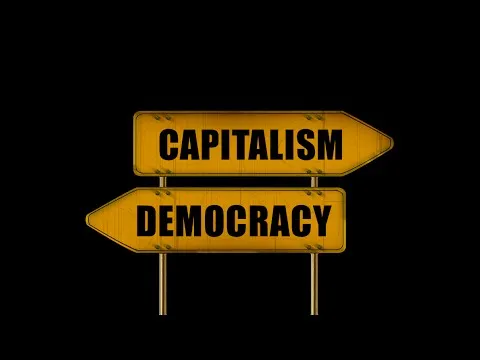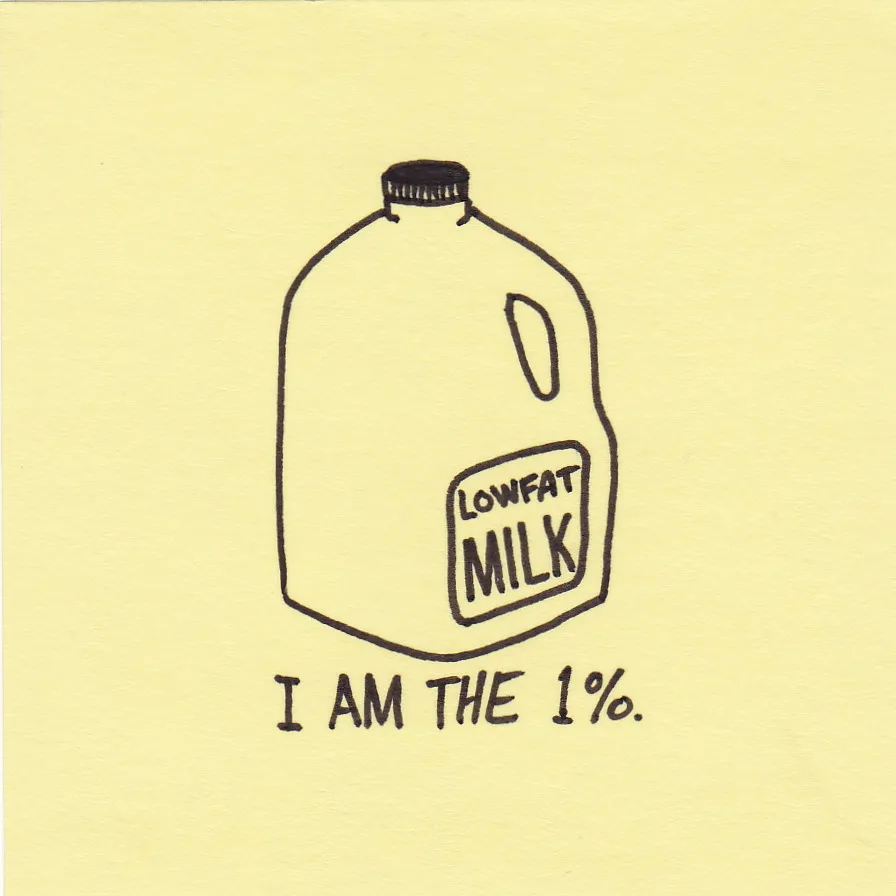I’ve had a lot of work lately and haven’t had much time to write about the topics I want to share on my blog. But reading a post on the paradox of being anticapitalist has pushed me to write a bit of political philosophy again, thanks whatamidoing! I want to explore more closely this idea that the search for alternatives to capitalism always fail (or make us hypocrites as whatamidoing says) because we depend on capitalism for our survival.
This is one of the key questions theorists have been addressing for some time now and answers are being developed, specifically because effective alternatives are being practiced, but this is something I will cover in another post. In this post, I first want to look at what it is that enables capitalism to capture dissension and contradiction, and explore how this has also taken over democratic decision-making.

While capitalism has a long history, I am going to start from the 1950s, when the welfare state developed. I’m choosing this point as it marks the linking of governance with economic growth. More specifically, the welfare state depended on 'conformist consumption'. Since production lines had limited flexibility, consumption choice was fixed to a limited set of configurations, meaning everyone had to consume the similar products and therefore ‘conform’ to the products on offer. Industries thus needed to make consumers want a homogeneous set of goods. Advertising and marketing industries boomed in this period as Edward Bernay's work on 'public opinion' and 'propaganda' was being remodelled to fit a corporate agenda. By manufacturing public opinion, corporations were able to stimulate and create demand that equalled production. Consumption and consumer sovereignty came to be understood in the public discourse as a common good because industry needed individuals to consume.
Two ideas lie here. First, that citizens progressively envisaged their role in society not as citizens but as consumers. Second, and more importantly, consumer-corporation relations changed from demand-led production (where consumers informed businesses on how they should act, what they should produce, and so on) to supply-led consumption. Here corporations no longer rely on market signals to inform how they should act, rather market demand gets created by corporate interests.

The 'liberation' and radical movements of the 1960s presented a challenge to conformist capitalism by proclaiming self-affirmation and a desire for the 'authentic'. In demanding 'authentic', 'individual' forms of life, radical movement that defined themselves as anti-capitalist struggles for individuality actually ended up creating a more pernicious form of capitalist hegemony. In responding to consumer's demands for more 'individual' and 'genuine' products and lifestyles, corporations turned counter-culture into market niches. Individuals would be able to express their disdain for the system through the consumption of symbolic goods that attached them to that identity. Ultimately, “'counter-culture' itself became a marketable identity”. In purchasing their identity in this way, individuals merely hide their conformity behind a plurality of edgy brands, or 'no-logo' brands.

Submission to the system in this manner only serves to further entrench its hegemony as these trends 'sanitise' capitalism and allow it to move beyond its contradictions. What appears as a substantial redistribution of wealth and power (because these various social movements 'succeeded' in changing the system) is in reality an appearance of choice and freedom. In other words, the fundamental symmetry between consumer and producer that lies at the heart of classical economic theory and the idea of a 'sovereign consumer' become highly distorted when consumer preference is manipulated. Understood from this sense, 'more market' really means 'more corporate power'.
The 2007-2009 economic crisis forms another important step in the redefinition of contemporary economic relations. Rather than opening the question of how to solve the crisis to public debate, the only concern was how to maintain growth through consumption since both were seen to serve the pursuit of private interests at all levels, whether individual or corporate. In this process, democracy was reduced to a set of neutral, value-free procedures and the citizen to a consumer. In other words, economy and politics were conflated to one and the same thing. This does not indicate a shift in the field of sovereignty but expresses its loss for the individual. In effect, the debate was about whether to save the banks, while ignoring the plight of millions of low- to middle-income households. The fact that movements like Occupy and the Indignados were ignored in favour of finance was justified by the 'common good' argument. But this framing is highly questionable when the 'common good' gets defined by the state or business.

How this common good gets defined draws directly on how consumer citizens are now conceived. Colin Crouch analyses the difference between 'consumer sovereignty', the democratic idea that the consumer chooses, to 'consumer welfare', where what is good for the consumer is a technocratic choice. Consumer welfare is understood as general gains across the economy since decision-making is done by state experts, and forms the basis of 'trickle down' economics. What is not explained to the population is how the distribution of this gain is ignored. By defining what counts as citizen's interest in this way, corporations and the state are in effect dethroning popular sovereignty. But sovereignty does not vanish. Using crisis as cover, sovereignty becomes an elite exercise of deciding the public interest. At the same time, one also collapses back into the idea that politics is reduced to economics and deprived of ethics.
This post covered the economic and political theory behind the way capitalism is able to integrate contradiction and revolt. What I did not cover was the conceptual framing which means the processes I have described above become reasonable and even desirable from a consumer/citizen’s point of view (this will be the subject of my next post).
A major change in the search for alternatives is the understanding that, because capitalism is so prevalent and has become so intertwined with the way we live our lives, we cannot simply step outside the system and hope to create new ways of relating to each other. I’ll be writing about this and what answers they offer in another post.
Alternatives are out there, the blockchain is potentially one of them! Stay positive and Steem on!
If you want to read more about politics, philosophy and capitalism, check out some of my other posts.
Minor Marxism and the Origins of Capitalism (Eugene Holland)
A Different Look at Stereotypes (Raoul Vaneigem)
Feminist Justice (Nancy Fraser)
References
- Crouch, Colin, 'Brand Values', RSA Journal, Vol. 157:5546, (Summer, 2011), pp. 10-13
- Crouch, Colin, 'Privatized Keynesianism: An Unacknowledged Policy Regime', The British Journal of Politics and International Relations, Vol. 11, (2009), pp. 382-399
- Crouch, Colin, The Strange Non-Death of Neoliberalism, Polity Press (Cambridge, 2011)
- Hickel, Jason, and Khan, Arsalan, 'The Culture of Capitalism and the Crisis of Critique', Anthropological Quarterly, Vol. 85:1, (2012), pp. 203-228
- Mishkin, Frederic, 'Over the Cliff: From the Subprime to the Global Financial Crisis', Journal of Economic Perspectives, Vol. 25:1, (Winter, 2011), pp. 49-70
- Mouffe, Chantal, The Democratic Paradox, Verso, (London, 2009)
- Mouffe, Chantal, The Return of the Political, Verso, (London, 1993)
- Schmitt, Carl, Political Theology: Four Chapters on the Concept of Sovereignty, University of Chicago Press Ed (Chicago, 2006)